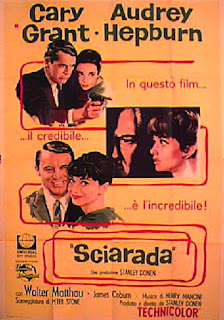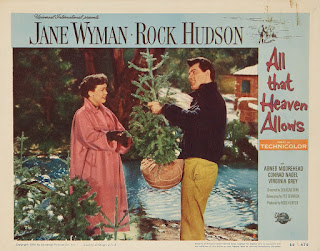Vincent Parry (Humphrey Bogart) has escaped from San Quentin; he tries to hitch a ride, but the driver, Baker (Clifton Young) realizes Vincent is an escapee. Vincent knocks him out and abandons the car down the road. He finds Irene Jansen (Lauren Bacall) painting in the countryside. She knows who he is and offers to help him. Against his better judgement, Vincent accepts her assistance. This week, we're looking at Dark Passage (1947).
While Lady in the Lake is credited as the first film to use the subjective camera technique, Dark Passage, released the same year, takes the idea and uses it to better effect. Not all of the film is subjective, and the motivation for not showing our protagonist becomes apparent when Vincent is taken to a plastic surgeon. Even when Vincent still has his original face (seen in a newspaper article - the photo is of actor Frank Wilcox), the film uses shadows to hide his face. That we do eventually get to see Humphrey Bogart in the latter part of the film is a benefit to the audience; the first view of his expressive eyes (when he is bandaged following the surgery) is something we've all been waiting for. Regardless, Jack Warner was not amused that for 40 minutes, his expensive star's face was nowhere to be seen (Eddie Muller intro and extro).

The actress who walks away with the film is Agnes Moorehead (Madge Rapf). William Hare said that in the role "the traditional femme fatale role was turned on its head...she is overbearing, domineering, and thoroughly ruthless" (Pulp Fiction to Film Noir: The Great Depression and the Development of a Genre) . She inserts herself into everyone's lives - her former fiance, Bob (Bruce Bennett); Irene, and, it turns out, the late Mrs. Parry. We dislike her from the minute she appears in Irene's apartment, but we can't take our eyes off her.
There are a remarkable number of excellent character actors in the film: Tom D'Andrea (Sam the Cabby), like Ms. Bacall, adds to our trust of Vincent in his willing acceptance of the escapee's innocence. Sam's open and friendly personality is believable because of Mr. D'Andrea's performance. Similarly, Houseley Stevenson (Dr. Walter Coley) brings just the slightest bit of menace to his role as the plastic surgeon who helps Vincent alter his appearance - will he disfigure him? Turn him in? His performance dances on the head of a pin. Finally, there is Clifton Young, who, from first glance is horrifyingly creepy. Baker is a heel of the first water, and Mr. Young plays him that way. We know he is going to be a key factor in Vincent's life, and Mr. Young does not disappoint.
If there is a weak link in the film, it's Bruce Bennett as the man romantically pursing Irene. Mr. Bennett, as we've mentioned before, is not a favorite actor. He's dull and fades immediately into the background. The plus to having him in the film is that one can imagine Madge bossing him around. What you can't believe is that he would have the gumption to break up with her, or that Irene would have even the slightest interest in him.
Based on a novel by David Goodis; later, Mr. Goodis, and his the estate sued United Artists for copyright infringement - stating that The Fugitive was based on Dark Passage (Mr. Goodis' estate won the suit, but the monetary amount was minimal). Like the novel, the film was set in San Francisco, and some scenes were shot on location (AFI catalog); the city and its hills are very important to the story.
Some reviews were indifferent - Bosley Crowther's New York Times review liked the scenery better than the story. He did have high praise for Agnes Moorehead who "is also quite electric in a couple of scenes as a meddlesome shrew." Variety's, review, on the other hand, was more complimentary, saying that the "dialog frequently crackles."
We very much enjoyed the film, and recommend it highly. Here's a trailer for a taste of what's to come:

























